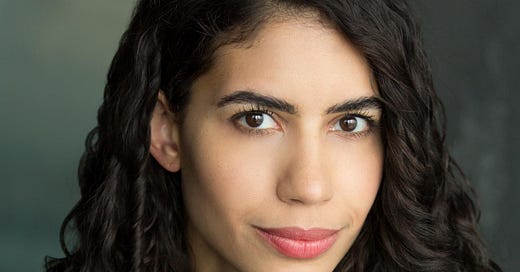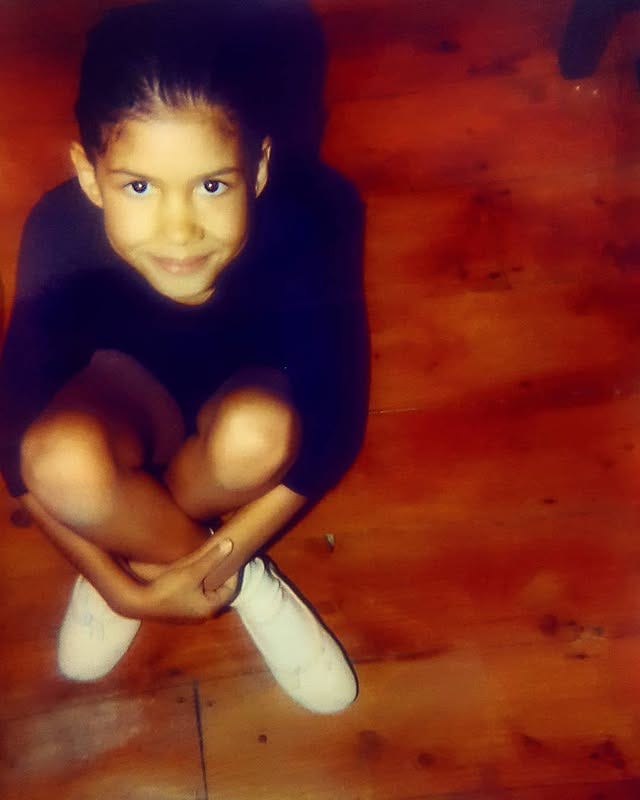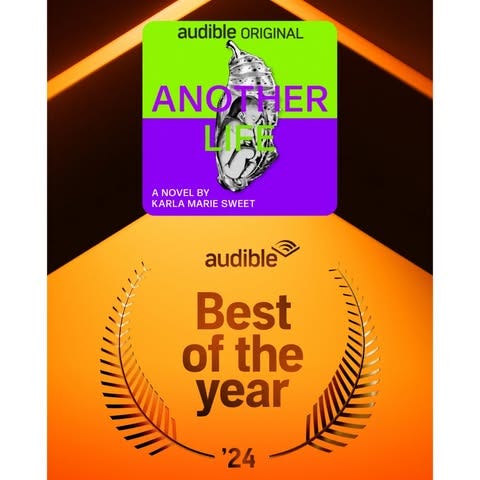Karla Marie Sweet: “There’s a lot of lines I’ve had to tread”
The author on unspoken histories, the context of Blackness and the lines she’s tread
Hi, welcome back to Mixed Messages! This week’s guest is
, who is of mixed-African American, Irish and white British heritage. Karla is an actor, screenwriter and novelist, with Another Life, a speculative fiction novel, available as an Audible Original. Her hotly anticipated second novel, False Idols, is out in August. Karla’s work often delves into questions of race and identity, and with a story like hers, it’s hard not to. Get to know Karla’s history below.How do you define your identity?
I’ve said dual-heritage, but that isn’t entirely true. It’s not really true for anybody. My dad is African American on his dad’s side and Irish on his mother’s side. My mum is white British.
We did an Ancestry DNA test to find out more about our African side as the waters got muddied during slavery. We found out they’re mostly Nigerian but also a little bit Malian, Cameroonian and Senegalese. To think about those cultures as a homogenous glob does them a disservice.
On forms, I tend to put white British and African American if I have the option. Otherwise, I’ll put African, which doesn’t feel entirely true. I’m a subsection within that which isn’t talked about in the UK, despite the fact that the reason I’m here is because of the 200,000 African American soldiers stationed in the UK during the Second World War.
Many of them left offspring behind, not because they wanted to, but because interracial marriage was illegal in America. My grandfather wanted to bring my grandmother over but wasn't able to because of the colour bar.
Where was your dad brought up?
My dad was raised in a children’s home here in the UK, as many were. Even though there are so many of us with that history, it’s not spoken about. It's not nice feeling invisible.
My dad grew up in Southport but then was fostered by a white family (who are still very much our family) in North Wales. When my mum was pregnant with me, my dad was asked lots of questions by doctors about his family history. He didn’t know anything, so he started looking into it.
By the time he found his mum, she had Alzheimers, but he managed to connect with his siblings and that side of the family in Bristol. We then hired a private investigator who reconnects the offspring of American GIs with their families. We found my dad’s sister, who told us he was overjoyed we’d got in contact. Her father, my grandfather, had been telling everybody for years that he had a kid in London and nobody believed him.
We were told to get to the US quickly as he had cancer and only a few months left to live. We had to jump through a lot of hoops and unfortunately by the time we could fly, we’d missed him by a day. We managed to see him in his coffin. My dad has siblings in the US, so we moved to get to know them better.
You spent your teenage years in Georgia – what was it like to have that experience?
Growing up around my African American family gave me a clear sense of identity.
We lived in a part of Georgia that is very mixed, which was a hugely different experience to my North Manchester primary school, where I was the only girl of Black heritage in my year.
I used to be bullied relentlessly for the way I looked. Clearly racist but less direct, like “you’ve got a weird nose, fat lips and big hair.” Those things made me feel like I was ugly. It wasn’t until my mid-20s that I realised “oh, I have those things because I’m Black.” I had a much better experience in America.
I definitely identify more with my African American side than my white British side, but I consider myself British first and American second. I think those of us who are mixed identify more with the side that we’re othered through. If I’d been born 150 years ago, I would have been a slave. Maybe a house Negro, but still a slave. I’d have had to use the coloured bathroom.
Thinking about the political and historical context for how I exist and how I show up in the world connects me more to that side of my identity. I am very conscious that I have access to white privilege, I feel a huge level of responsibility to do something with it.
Did you have conversations about being mixed with your family?
We had conversations about what being Black was, particularly with my dad. Growing up in the UK before Windrush, he was often the only Black person in all white spaces. In Wales, he was Black, but it’s all about the context of Blackness – we were considered lighter-skinned in Georgia.
My connection to my heritage strengthened when we really started to get to know the family out there. I don’t feel confused within myself. It tracks with my other identities in a lot of ways – I’m also bisexual, a dual national, I’m mixed-handed, I consider myself from a low-income background but culturally middle class, so there’s a lot of lines I’ve had to tread.
How does being mixed play into your writing?
For Lucy’s part of the story, I forced myself to write from a white, middle-class woman’s perspective who grew up in and around London. That was challenging as none of that is my experience as somebody who is Northern, from a low-income background and mixed-race.
I found it harder to write from her perspective than that of Omar, who is mixed-race but a man who lives 40 years in the future. I based a lot of his experiences on my dad’s: growing up in a children's home, going into digs when he was 15, being moved around… that feeling of being unsettled, which is true to the immigrant experience. The instability of having to travel light in case you get moved on.
In some ways, I relate to that feeling of instability. I’ve lived in the precariat for such a long time, as a creative person who doesn’t have a safety net. Omar has a lot of experiences that allude to or are an allegory for race, with a parallel in the immigrant experience.
In my second novel, False Idols, the character of Sadie is mixed-race. She grew up in Georgia then moved to LA. There are a lot of things that happen to her that don't necessarily happen to her because she’s mixed-race, but the way they happen to her is very much influenced by her race. We see her existing in two worlds and learning to live.
How do you think perceptions of mixedness have changed?
I assistant produced an episode of a show on BBC 1Xtra with a mixed-race presenter on the topic of being mixed and many of the messages we received were unsuitable to be read on air. They were horrific. We were like “fuck, people really hate our existence.” That was my first experience of hate from the Black community.
Over time, I’ve learned you can’t allow anybody else to define what Blackness is for you. There’s so much diversity within each diaspora. There might be some things we experience on a general level, but everything else is down to the specificity of our lives. As long as you hang on to a sense of identity and bring that to whatever relationship you’re in, so your kids can be educated on where they come from and have an understanding of their own identity, that’s all that matters.
What’s the best thing about being mixed for you?
Access to different cultures. The diversity of experience that I have been able to have and being able to empathise with those. I love being mixed, there’s this idea of being fractured and confused but I don’t feel like that at all. I’m proud of who I am. I wouldn't want to be any other way.
Can you sum up your mixed experience in one word?
Diverse, even though I hate the way the word has been co-opted as this idea of anything that is not cis-het, white and able bodied. I’ve had very diverse experiences.
Subscribe to Karla’s Substack, The Ampersand, here. Next week, I’ll be speaking to writer, photographer and presenter Johnny Pitts. Subscribe to get Mixed Messages in your inbox on Monday. Shop Mixed Messages on Etsy now.
Enjoy Mixed Messages? Support me on Ko-Fi! Your donations, which can start from £3, help me pay for the transcription software needed to keep this newsletter weekly, as well as special treats for subscribers. I also earn a small amount of commission (at no extra cost to you) on any purchases made through my Bookshop.org and Amazon affiliate links, where you can shop books, music and more by mixed creators.
Mixed Messages is a weekly exploration of the mixed-race experience, from me, Isabella Silvers. My mom is Punjabi (by way of East Africa) and my dad is white British, but finding my place between these two cultures hasn’t always been easy. That’s why I started Mixed Messages, where each week I’ll speak to a prominent mixed voice to delve into what it really feels like to be mixed.











I’m so happy this space exists and these conversations are happening. Thank you!